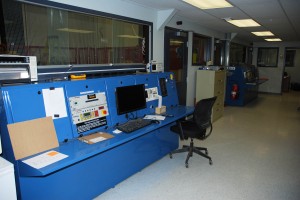Commitment to Excellence
HPS has been regarded for high quality since its very inception.
With our commitment to Excellence and Continuous Improvement,, we build value and reliability into every HPS product. No other transformer company can offer our flexibility for service and quality in a full range of products.
- All facilities have implemented quality management systems based on ISO 9001:2008 with the Guelph and Monterrey facilities having certification to this quality standard.
- Our units are designed to meet ANSI, CSA, UL, IEC, ABS and NEMA standards required by our customers.
- With our commitment to Excellence and Continuous Improvement, we build value and reliability into every product.
- HPS stands behind its quality with warranties on both standard and special products that exceed industry standards.
HPS has testing facilities in all manufacturing locations to ensure product quality. These testing capabilities include:
- Heat Run
- Partial Discharge
- Induced Voltage Test
- Sound Level
- Transformer Losses
- (Hi Pot) Applied Power Frequency
- Voltage Test
- Short-Circuit Test
- EMF
- BIL
- Insulation Resistance
- Inductance ResistanceHarmonic Test Bench
- Unique Testing Upon Request

Design & Engineering Talent
HPS maintains a world-class Design Centre in Guelph, Ontario. This centre is a powerful resource for all of HPS’ global locations including HPS in Europe. With over 30 engineers and technicians, the centre’s focus is threefold.:
- Maintaining standard product lineup
- Tailoring designs for OEM partners
- Overseeing the design and manufacturing of custom transformers

This design talent is transforming HPS into a full-fledged global transformer platform combining design, engineering, manufacturing and service.
Whether it is prototypes, thermal modeling, harmonic assessment, retrofitting, tight physical dimensional requirements or any other unique magnetic problem, our engineers will work with our customers to develop and deliver the most cost-effective design available.

We particularly emphasize our ‘Value Added Engineering,’ whereby our design staff will interface with your team to produce the optimum transformer design. They have the training, experience and technical expertise to excel in the design of transformer and related magnetic products for almost any special application. Our 3-D modeling design and CAD facilities permit quick and effective communication when time is crucial.
- Over 3000 custom designs are engineered and built every year.
- HPS has designed over 250,000 designs in over 90 years of business.
- HPS engineering staff have the latest software enabling them to assist with the development of designs including, Solid Works (3D Modeling), AutoCAD and P Spice electrical simulation.
Manufacturing & Delivery
World-class manufacturing and testing operations enable HPS to produce the most advanced and reliable dry-type transformers in the market today.
By deploying the latest manufacturing advances and leading-edge test methods, we can build performance and reliability advantages into every transformer.
The multi-national strategy of HPS provides us with the ability to shift products between plants as required to give customers key advantages in delivery schedules, flexible capacity management, disaster proofing and balancing foreign content.
“Quality Control and Continuous Improvement is Part of Everyone’s Job”
HPS employees have a passion for continuous improvement in all phases of the design and manufacturing processes in order to meet the specific requirements for a broad range of customers, for even the most onerous of transformer applications.
Core Construction
HPS cores are manufactured from high grade non-aging, fully processed silicone steel laminations. Cores are precision-cut to close tolerances using modern equipment, to eliminate burrs and optimize energy efficiency. The completed core is sealed in epoxy to reduce the risk of exposure to moisture.
Coil Construction
Coils are available in either aluminum or copper construction. Coils are precision wound with continuous copper or aluminum conductors and are electrically balanced to minimize axial short-circuit forces. The particular design of the ducts inside the coils permits the flow of air, thus providing excellent cooling in addition to providing superior axial mechanical strength.
Insulation
High-quality temperature and mechanical resistant materials are used as insulation materials to give the transformers a long lifetime for every temperature class requested. Particular solutions can be taken when the installation has difficult ambient conditions (humidity, pollutions, chemical agents, etc.).
Core and Coil Assembly
Coils are held rigidly in place between insulators clamped to the upper and lower core frames under high compression. Winding terminals can be secured firmly to the transformer structure. Particular additional fixing devices are provided when high mechanical performances are required (in case of presence of vibration, of earthquake resistances, etc.).
Impregnation
A critical element of long-term transformer performance is the integrity of the dielectric properties of the insulation materials. In order to meet the designed life expectancy, the impregnation process has to be made with a very accurate and repeatable cycle.
Coils are placed in a sealed tank and one full atmosphere of vacuum is drawn.
The impregnation resin is then introduced into the chamber and the coils or assembly, and is then completely immersed in the impregnation resin.
The coils or assembly are removed from the chamber and oven-cured.
The result is transformer coils that exhibit virtually corona-free performance, a superior resistance to environmental conditions and a new standard of reliability even for the most demanding industrial, utility or commercial applications.
Cast Resin Process
With this process, the windings are encased in a solid epoxy resin.
HPS offers maximum protection of the coils from dust and corrosive atmospheres.
Coils are placed in a mold and the resin is added under vacuum atmosphere.
The coils are then removed from the chamber and oven-cured.
The quality of the processes is checked with the value of partial discharge.
The average values of partial discharge measured on HPS cast resin transformers are significantly lower than the maximum request by the standard due to the overall quality of the materials and process.
